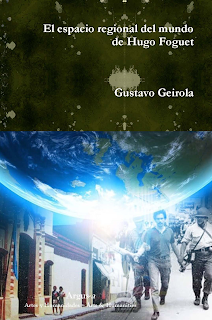Este libro puede adquirirse en amazon.com y en lulu.com
Ilustración de tapa: Vania Paola Bilen
 Este libro es un ensayo breve sobre Pretérito Perfecto (1983), la novela del escritor tucumano Hugo Foguet (1923-1985). Foguet se ha propuesto desbaratar los ideales folklóricos y tradicionales de la llamada literatura regional o del interior, ideales en su mayor parte fabricados en Buenos Aires para encasillar la literatura que se produce en provincias. Hay una idea de totalidad en la escritura foguetiana: abarcar la historia de Tucumán, hacer de la ciudad de San Miguel de Tucumán no un paisaje sino una topología, un sujeto que habla, explorar el fin de la modernidad por medio de los episodios locales y mundiales de las décadas del 60 y 70, etc. Sin pretensión de realizar un análisis exhaustivo de la novela, Geirola –en este ensayo escrito a principios de la década de 1990, perdido y rescatado en mayo de 2018 del mal de archivo—se detiene en algunos aspectos que hacen del texto foguetiano un acontecimiento narrativo para la literatura argentina: los riesgos y peligros políticos del chisme y el rumor, la relación entre sueño y memoria, represión e ironía, polifonía, monología e intertextualidad, androginia y hermafroditismo, apocalipsis y malestar en la cultura, entre otros. Se trata de algunos tópicos que, sin duda, abren al porvenir el juego de las lecturas posibles de Pretérito Perfecto.
Este libro es un ensayo breve sobre Pretérito Perfecto (1983), la novela del escritor tucumano Hugo Foguet (1923-1985). Foguet se ha propuesto desbaratar los ideales folklóricos y tradicionales de la llamada literatura regional o del interior, ideales en su mayor parte fabricados en Buenos Aires para encasillar la literatura que se produce en provincias. Hay una idea de totalidad en la escritura foguetiana: abarcar la historia de Tucumán, hacer de la ciudad de San Miguel de Tucumán no un paisaje sino una topología, un sujeto que habla, explorar el fin de la modernidad por medio de los episodios locales y mundiales de las décadas del 60 y 70, etc. Sin pretensión de realizar un análisis exhaustivo de la novela, Geirola –en este ensayo escrito a principios de la década de 1990, perdido y rescatado en mayo de 2018 del mal de archivo—se detiene en algunos aspectos que hacen del texto foguetiano un acontecimiento narrativo para la literatura argentina: los riesgos y peligros políticos del chisme y el rumor, la relación entre sueño y memoria, represión e ironía, polifonía, monología e intertextualidad, androginia y hermafroditismo, apocalipsis y malestar en la cultura, entre otros. Se trata de algunos tópicos que, sin duda, abren al porvenir el juego de las lecturas posibles de Pretérito Perfecto.
This book is a short essay on Pretérito Perfecto (1983), the novel by the Tucuman writer Hugo Foguet (1923-1985). Foguet has proposed to disrupt the folkloric and traditional ideals of the so-called regional or interior literature, ideal for the most part made in Buenos Aires to pigeonhole the literature produced in the provinces. There is an idea of ​​totality in Foguet's writing: to cover the history of Tucumán, to make the city of San Miguel de Tucumán not a landscape but a topology, a subject that speaks, to explore the end of modernity through local episodes and of those in the world during the 60's and 70's, etc. Without pretending to carry out an exhaustive analysis of the novel, Geirola -in this essay written in the early 1990s, lost and rescued in May 2018 from the evil of archiving- pauses in some aspects that make the Foguetian text a narrative event for Argentine literature: the risks and political dangers of gossip and rumor, the relationship between dreams and memory, repression and irony, polyphony, monology, and intertextuality, androgyny and hermaphroditism, apocalypse and discontent in culture, among others. It is about some topics that, without a doubt, open to the future the game of possible readings of Pretérito Perfecto.

